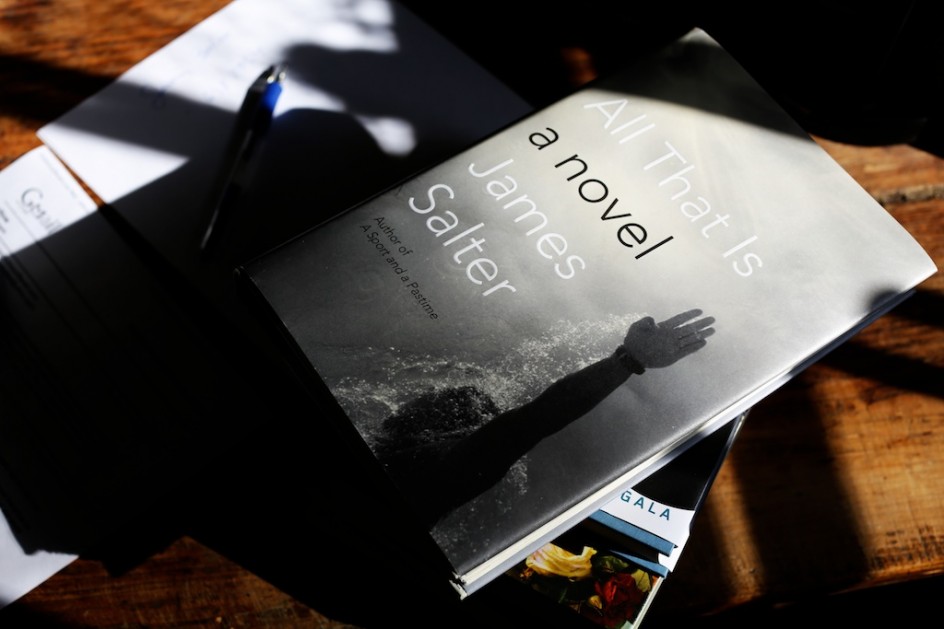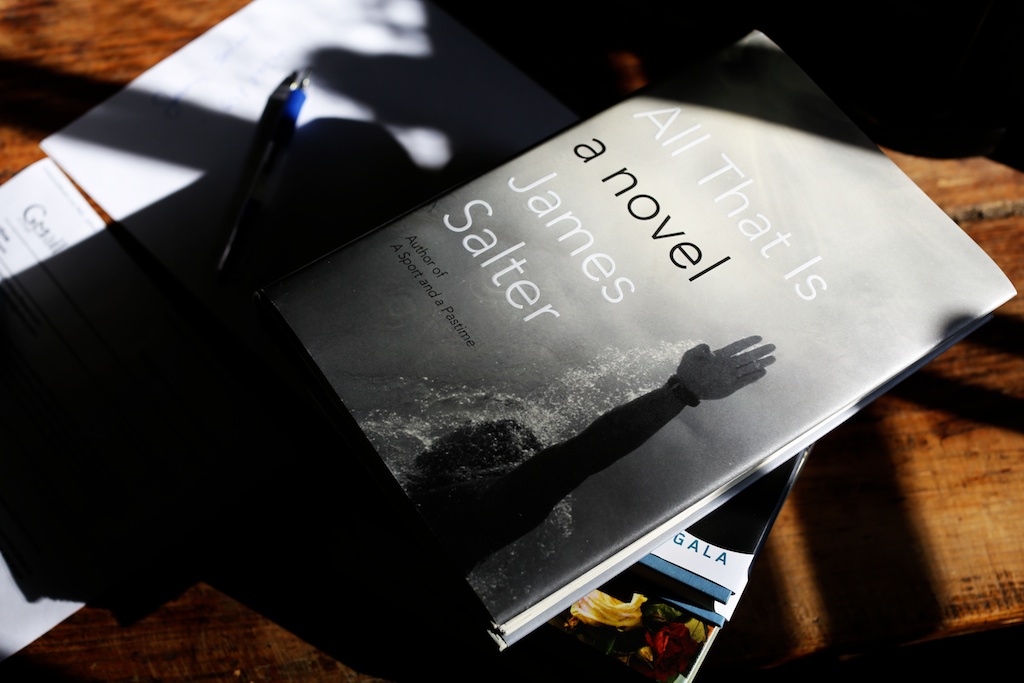
This review is written in conjunction with my local independent bookstore, Battenkill Books and is an effort to support bookstores as well as good books. If you wish to purchase this novel, please consider buying it from Battenkill or you local independent bookstore. Bookstores are important to creativity, community, individuality, independence in a country being consumed by corporate greed. You can call the store at 518 677-2515 or e-mail Connie Brooks at [email protected] or visit the store’s website. They take Paypal and ship anywhere in the world. They are lovely people, too. I will sign and personalize any book of mine purchased from Battenkill Books.
__
The best reason to read any James Salter book is that you love language and wish to see a legendary creator of prose at work. Salter’s writing is vivid, beautiful and brilliant. I confess to being a bit reluctant to read this book at first as Salter has not published in some time and is 90 years old. Shame on me. I am very grateful that I listened to my better impulses. Salter hasn’t lost a step in his writing. He is one of the masters, a talent lost in the swirl of media hype and mayhem that passes for news in America. A Salter book (Burning The Days, The Hunters, Last Night, Light Years) is an event for anyone who loves books and great writers. They say the novel is dying, but I think it’s just occupying a smaller space in our chaotic cultural universe. Wonderful writing is there if you want to look for it. A Salter book may not be the event it once was, but if you love books, it is a wonderful thing.
The great writers do not need serial killers or explosions or international intrigue to tell their stories. They write books that seem, in some ways, to be about nothing, about single, even small lives, yet they are about the biggest events in the world. In some ways, the plot doesn’t really matter, you read James Salter or John Banville to experience the gorgeous orchestration of words, the Mozart’s of the keyboard. It is probably true we won’t be seeing many writers like this in the future, publishers don’t really like them anymore, and don’t nurture or promote them, and they are barely noticed in our culture, so all the more reason to cherish this All That Is (Knopf.)
This novel tells the story of Philip Bowman, a young naval officer who served in the great naval battles off of Okinawa in World War II, a time of unimaginable sacrifice and courage. After the war, he returns to America and finds work as a book editor. Back then, publishing was a private affair, the great houses run by men and women (mostly men) who loved books, delighted in discovering and supporting writers, and quietly shaped the culture of their times. Bowman moved among the scattered family of publishing houses in America and in Europe, went to those fabled literary gatherings in apartments and East Side restaurants and bars and talked about writers and books well into the night. Layoffs were unimaginable and marketers were kept far away from the creative process. Writers were not to be bothered by sales figures, and publishers often bought books from writers who were all washed up because they wanted to help them survive. No one dreamed that publishing would ever fall into the hands of the corporate monoliths. In the summers nobody worked on Friday’s or Monday morning – they were all heading back from the Cape or Maine. Christmas parties were lavish, festive, alcoholic revels. Several times a year, the ranking editors all flew to Europe to talk to their sophisticated colleagues there and go to book fairs.
Bowman, a graduate of Harvard, urbane and witty, fit perfectly into this long vanished world. He made good deals, loved and nourished writers, navigated his literary career. He never made a lot of money, but was always comfortable. You didn’t need that much money to have an apartment in New York, a maid and a house in the country.. Despite his professional success, it was love that escaped him, eluded him, puzzled him and hurt him badly. He lived alone and suffered heartbreak. He could be ruthless and predatory in his love affairs. His first marriage collapses, another never happens and he finally meets a woman who enthralls and captivates him, but this romance, too, alters his life in ways he never imagined. Bowman had never had children, struggled to understand the whole idea of family.
The real story of course, is about pre-corporate America, the years after World War II when middle-class people like Philip could make it in New York City, find meaningful and secure careers, buy houses in the Hamptons for $120,000 and never worry about their jobs, futures or retirements. Bowman’s father abandoned him when he was young, and his mother rarely spoke her mind to him about her life or his life. Bowman has almost everything anybody could want, except the one thing he wanted the most – someone to love and share his life.
Salter tells the story of one life beautifully, he writes like a painter, his images profiles and descriptions so precise yet rich.
Here, he describes the house of a friend who has just suffered a great tragedy:
“The ways divide. In the house above the river to which a room had been added, a small room with a window at one end and of a size that almost invited one in to sit and open a book or gaze out into the little garden, untended but nevertheless intimate because of the sculpture in it, a piece of natural sculpture that had been part of a tree that was cut down and sawed into two-foot logs, one of them, thick and upright, happening to have the shape of a woman’s body from waist to where the legs began, a kind of primitive altar piece, neo-African, rounded, dark, immune to weather – in this house where Eddins, his wife, and son had lived in happiness, free from danger, where the neighbors were good people, the streets were quiet, the police, finally past their bitter feud with the mayor, were friendly and knew you by name, here among the trees and village calm, like something fallen from the sky, a great engine detached from an airliner high above and and unseen and unheard hurtling down, death had struck, destruction, plunging into life like a sharpened stake.”
Salter’s paragraphs are little gems to me, poetry, sculptures wondrously crafted. You will not often find writing like this. His subject, of course is life, it’s up and downs and unpredictable trajectories. No more, no less. Not much drama, but a lot of feeling. The unspoken theme is change, the capturing of another, safer and more coherent time, another world. Before health care was the purpose of work, employers could be generous and loyal, and every career was fragile and expendable. Salter is not sentimental, nor he is nostalgic. He just paints a wonderful picture of a man trying to find himself in another time. I highly recommend this book. It is for anyone who loves language and ponders the nature of life, love and yearning.
Next: I’m reviewing the new Donna Leon mystery (set in Venice.)









